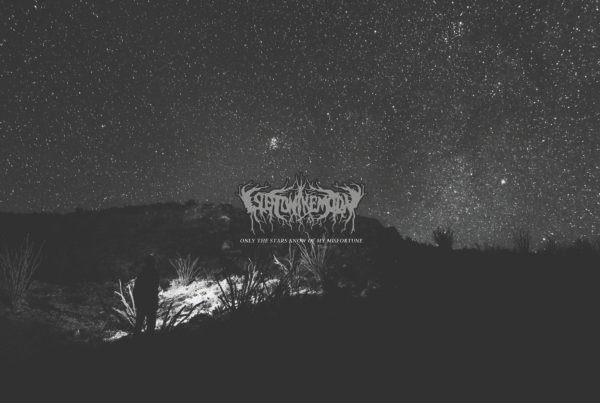Bold art is attractive. A brave artist might obliterate a musical frontier, embody a deeply held message, or both; in any case, a bold new release stakes the artist’s reputation – not to mention financial well-being – on an idea of potentially high personal value. Of course, a record can fall flat Icarus-style no matter how audacious the artist’s intentions are (shit has to sound good, too), but I’ll always have instant respect for artists who reshape musical boundaries while discussing salient real-world themes all the while, even if the end musical product is not perfect.
Violet Cold is a courageous artist. Emin Guliyev, who appears to have discovered a cure for writer’s block, has skipped, tumbled, and somersaulted across broad swaths of musical territory since he started the one-person project in the mid-2010s. It’s been exhilarating to watch Guliyev’s artistic career blossom: fans speak longingly of each of his ambient, post-rock, and blackgaze periods (we are canonically in the latter) and, to paraphrase my above hyperlink, the dude’s Bandcamp page literally scrolls. There is no preset point of entry for the neophyte to approach Violet Cold‘s discography; a few of my esteemed EIN colleagues recommend euphoric post-black stunner Magic Night, but I’d encourage new listeners to tackle the mighty genre cornucopia that is the Sommermorgen trilogy. The suite bursts to the seams with gleaming ambient vistas, synthwave cruisers, and more than a few blackened accents; in other words, a harbinger of a certain 2021 release.
Pissing off corpse-painted connoisseurs with a decidedly unconventional approach to black metal is one thing, but Guliyev the person is just as unconventional as Violet Cold the band. Guliyev has been candid about his difficulties with monetizing music, and his strong moral compass and ardent activism have angered more than a few fashies, nationalists, and general haters – and, no doubt, have attracted progressive fans who might be inherently suspicious of a black metal-adjacent project. New release “Empire of Love” is no exception to the trend, with a gussied-up Azeri flag for the cover and song titles evocative of contemporary progressive causes (“Pride”, “We Met During the Revolution”).
So, uh, yeah, the latest Violet Cold is not a boring album. Eye-catching album cover notwithstanding, the record makes a strong first impression. “Cradle” opens with the trappings of a Winterfylleth or a Falls of Rauros, snuggling folksy plucked strings on what sounds like a traditional Azeri tar deeply among phyllo-like layers of distorted guitar, crisp, anthemic drums, and angelic synths. Second track “Pride” rips a sharp 90-degree turn, pitting sweet, looping dance pop vocals against Guliyev’s razorwire shrieks buried under thick walls of sound. Drums oscillate between calve-shredding double bass runs, classic blast beats, and simple rock arrangements, and the serious tremolos and synths from the intro cut reemerge to heighten the contrast between poppy and blacker elements.
This opening couplet may give off peanut butter-and-bologna sandwich vibes to some cautious listeners, but reluctant folks might start to appreciate Guliyev’s reliable ear for fruitful contrast and catchy tunes by the time “Be Like Magic” swings around. If it’s possible to denote a single track off this record that embodies the spirit of Empire of Love, it’s this one. A spoken word passage propped up by sparkling piano and a simple programmed beat builds up to a sturdy climax of mournful wails, synths, and Guliyev’s reliably piercing harsh growls. These tools aren’t common to each track, but the equal time given to harsher and to softer melodic passages is roughly representative of the album’s approach to dynamics. Empire of Love sees Violet Cold fasten elements from genres as disparate as blackgaze and electronica to one another, finding plenty of joy in the tension between harsh and soft.
Next track “We Met During the Revolution” seizes the mike with late 2000s high school prom-style vocals, an endless stream of tapped guitar wizardry, and darker passages redolent of early Alcest‘s harsher, vocal-led soundscapes. Out of the more experimental tracks, this flows the smoothest from pop-heavy verse to traditional blackgaze bridge. Guliyev’s extended tapping runs trade time in the spotlight with poppy vocal leads, which in turn segue into dramatic tremolo-led passages before the cycle repeats once again. Perhaps it’s not so simple as devoting equal time to vastly distinct elements, and I think my initial skepticism about Violet Cold‘s formula on Empire of Love (upbeat blackgaze foundations + upbeat pop elements = upbeat, if messy songs?) was as unfounded as it was reductive. There is an undeniable beauty in the way Guliyev twists the listener’s sense of dynamics on this album, and what’s just as impressive is that he writes catchy, ear candy-packed ditties even under the auspices of such an adventurous concept.
The album doesn’t stick to the pop/blackgaze dichotomy from track to track, though, as Guliyev throws a bone to longtime listeners with “Togetherness”. Sweet plucked notes on the tar and plaintive synths offset a bright rhythm section and ponderous guitar; this mellower contrast of dark and light tonal elements serves as a palate-cleansing aperitif after some of the record’s more audacious moments while harkening back strongly to Violet Cold‘s post-rock days. It’s a sweet morsel after six strongly experimental tracks, and indicates that the ‘popgaze’ concept on Empire of Love might not be a permanent course correction for the project but perhaps their boldest experimental moment thus far.
Ultimately, it’s Violet Cold‘s greatest strengths that make Empire of Love both a rewarding, engaging, straight-up fun listen and an at times frustrating one. One would have to be an incredibly unfair listener to get bored of the album’s continuously evolving mash-up of blackgaze, post-rock, and electronic music; on the other hand, I have struggled with the album’s occasional lack of focus, and have occasionally caught myself wishing that Emin Guliyev stuck to one concept rather than what a grumpier person might call the record’s laundry list of gimmicks. Violet Cold‘s insistence on paying equal due to its constituent components occasionally undercuts execution; an atmospheric passage might linger too long and disrupt a track’s flow, what would be an unbelievable guitar solo languishes far too low in the mix, or a poppy verse might exit the stage before we are fully able to appreciate it. Tracks don’t extend their stays overlong, but I do find myself wishing that Guliyev explored the fruitful fusion between harsh and soft elements even more than he already does – perhaps an unfair request given how bold the record already is.
This all being said, Empire of Love is a triumphant record that succeeds both because of and in spite of its frank boldness. The album adds yet another path to Violet Cold‘s fractal-like musical journey, blazing new ground both for Emin Guliyev and for listeners everywhere. Despite a few hang-ups related to the album’s scatterbrained nature or its rusty production, I am attracted to this release for its catchiness, its melody, and its gravity just as much as I am to the way it takes liberties with genre convention. I can’t wait to see where Violet Cold takes us next.






